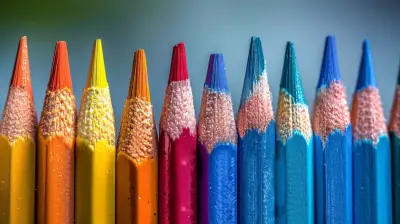Encouraging Self-Discipline in Today’s Youth
30 June 2025
Self-discipline. It’s like that spinach your mom always told you to eat—tough to swallow at first, but packed with benefits. In a world filled with endless distractions (hello, TikTok and video games!), helping young people develop self-discipline is more important than ever. But let’s be real—discipline sounds boring, right?
Well, not necessarily! What if I told you that self-discipline is actually a superpower? Yep, just like Spider-Man has his spidey senses, young people with self-discipline have an edge in life. They can resist distractions, chase their goals, and build habits that lead to long-term success.
So, how do we encourage self-discipline in today’s youth without sounding like strict old-school teachers? Let’s dig in! 
🎯 Why Is Self-Discipline So Important?
Before we talk about how to encourage self-discipline, let’s answer the big question—why does it even matter?1. Better Academic Performance – No surprise here. Students who can manage their time and focus on studying instead of scrolling social media often perform better in school.
2. Stronger Work Ethic – Future employers love disciplined individuals. Whether it's meeting deadlines or showing up on time, self-discipline lays the groundwork for career success.
3. Healthier Lifestyle Choices – Saying no to junk food? Getting up early for exercise? Sticking to a sleep schedule? Yep, self-discipline plays a role in all of that.
4. Increased Confidence & Independence – When kids learn to manage themselves, they don’t need constant reminders or hand-holding from parents and teachers. 
🚀 Strategies to Encourage Self-Discipline
Now that we know why it matters, let’s explore some practical ways to instill self-discipline in today’s youth.
1. Start Small & Keep It Simple
Ever tried lifting 100 pounds at the gym on the first day? Probably not! The same applies to self-discipline—it starts with small steps.Encourage kids to take on tiny challenges, like making their bed every morning or completing their homework before gaming. Small wins build momentum, and before they know it, self-discipline becomes second nature.
2. Help Them Set SMART Goals
No one likes vague advice like “be more disciplined.” What does that even mean? Instead, teach them to set SMART goals (Specific, Measurable, Achievable, Relevant, and Time-bound).For example:
❌ “I will study more.”
✅ “I will study math for 30 minutes every day at 6 PM.”
Clear goals make self-discipline easier to follow and track.
3. Teach Delayed Gratification
Instant gratification is everywhere—one click to watch a movie, food delivered in minutes, notifications buzzing every second. But real success? That requires patience.Introduce kids to the idea of delayed gratification—the ability to wait for rewards. The famous “Marshmallow Test” showed that kids who resisted eating a marshmallow immediately for a bigger reward later were more successful in life.
Encourage this mindset through small challenges:
- Saving money for something big instead of spending impulsively.
- Finishing homework before watching TV.
- Practicing a skill instead of quitting when it gets tough.
4. Be a Role Model (Yes, That Includes You!)
Let’s be honest—kids learn more from what we do than what we say. If they see adults procrastinating, breaking promises, or glued to their phones, they’ll probably think, "Why should I be disciplined?"So, if we want kids to develop self-discipline, we need to practice it ourselves. Set a great example—whether it’s sticking to your own goals, exercising regularly, or managing your time wisely.
5. Encourage Responsibility with Consequences
Kids need to understand that actions have consequences. If they don’t complete their homework, they shouldn’t expect good grades. If they forget to set an alarm, they’ll be late for school.Instead of constantly nagging, let natural consequences teach them valuable lessons. It might be tough at first, but these experiences shape responsibility and accountability.
6. Create a Structured Routine
Imagine trying to function without a plan—it’s chaos, right? Having a daily routine helps develop discipline without feeling overwhelming.A structured routine includes:
✅ A fixed wake-up and sleep time
✅ Scheduled study sessions
✅ Time for hobbies and relaxation
✅ Regular exercise
When good habits become part of everyday life, discipline follows effortlessly.
7. Encourage Journaling & Reflection
Self-discipline isn’t just about doing things—it’s also about understanding why we do them. Encourage kids to journal about their goals, progress, and struggles.Reflection helps them stay accountable and adjust habits when needed. Plus, it’s a great way to clear the mind and stay focused.
8. Make Self-Discipline Fun!
Who said discipline has to be dull? Gamify the process!- Use Reward Systems: Small rewards (stickers, points, privileges) can make goal-setting exciting.
- Turn Chores into Challenges: "Can you finish cleaning before the timer runs out?"
- Encourage Friendly Competitions: Who can read the most books in a month?
When discipline feels like fun instead of a chore, kids are more likely to stick with it.
9. Limit Screen Time (Without Being a Villain!)
We all know screens can be major distractions. But completely banning them? That might lead to rebellion.Instead, guide kids toward a balanced approach:
- Set specific screen time limits.
- Encourage tech-free zones (like during meals or before bed).
- Replace screen time with engaging alternatives like board games, puzzles, or outdoor activities.
Technology isn’t the enemy, but uncontrolled usage can weaken self-discipline.
10. Teach the Power of "No"
Let’s face it—saying no is hard. But self-discipline often means resisting temptations.Encourage kids to practice saying “no” to:
🚫 Procrastination
🚫 Unhealthy food choices
🚫 Peer pressure
🚫 Time-wasting activities
The ability to say “no” when necessary strengthens willpower and builds confidence. 
🎉 The End Result? A More Confident & Capable Generation
Encouraging self-discipline in today’s youth isn’t about turning them into robots who follow strict schedules. It’s about helping them develop habits that make life easier and more fulfilling.With a mix of patience, creativity, and the right strategies, self-discipline can become something kids embrace rather than resist. After all, when they learn to control their habits and choices, they're not just following rules—they’re shaping their own futures.
And that? That’s a life skill worth teaching.
all images in this post were generated using AI tools
Category:
Character EducationAuthor:

Olivia Chapman
Discussion
rate this article
2 comments
Levi Brown
Self-discipline is the cornerstone of success! By instilling this vital skill in today’s youth, we empower them to conquer challenges, embrace responsibility, and unlock their full potential. Let’s nurture resilient minds and inspire a generation that thrives on commitment and determination!
November 25, 2025 at 11:26 AM

Olivia Chapman
Absolutely! Self-discipline is essential for success, and nurturing it in our youth will empower them to face challenges and realize their potential. Let's inspire resilience and commitment together!
Lennox McGowan
In today's fast-paced world, fostering self-discipline in youth is essential for success. By instilling a sense of responsibility and goal-setting from an early age, we empower young individuals to navigate challenges effectively. Emphasizing intrinsic motivation and providing supportive environments can cultivate lifelong habits that promote resilience and personal growth.
July 13, 2025 at 3:10 AM

Olivia Chapman
Thank you for your insightful comment! I completely agree that nurturing self-discipline and intrinsic motivation in youth is crucial for their long-term success and resilience.


